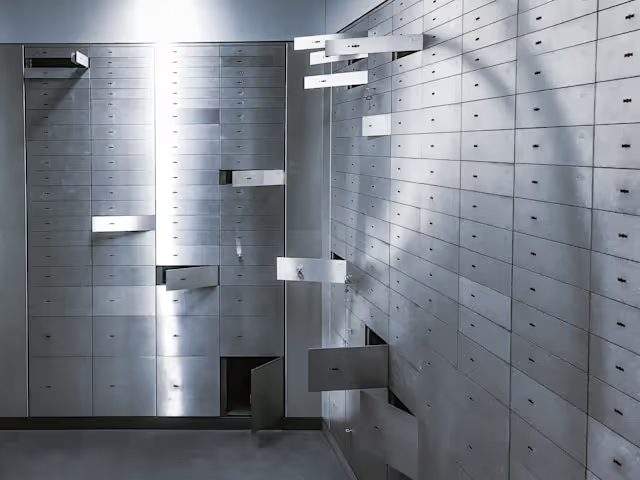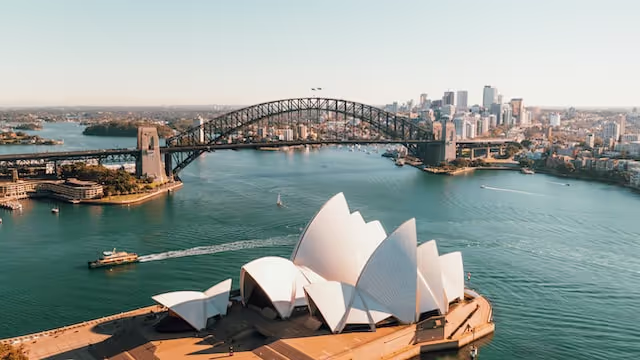
Blog
Is Your Money Safe in a New Zealand Bank?
New Zealand’s Depositor Compensation Scheme (DCS) explained
It's not something we think about often, but what happens to our money if a bank fails? This is a valid question, especially when we see headlines about "bank runs" overseas. A bank run happens when many bank customers try to withdraw their money from a bank at the same time, often due to a loss of confidence. In the past, this meant people literally lining up to pull out cash. Today, these runs are often "silent," with a flood of electronic transfers to other banks, but the result is the same: it can cripple a bank. This is just one of the risks banks face.
The good news is that New Zealand's banking system is one of the most stable and well-regulated in the world. Your money is likely far safer in the bank than it would be stashed at home, where it's vulnerable to theft, fire, or other disasters. After all, your mattress isn’t as safe as a bank vault!
Aside from vaults and heavy cyber security, let’s explore the added layer of protection for your banked money: New Zealand’s Depositor Compensation Scheme (DCS).
Guaranteed Banked Savings
Up until mid-2025, New Zealand was the only OECD country to lack any form of bank deposit insurance or government guarantee.
Now, if your New Zealand bank, credit union, building society, or (selected) finance company fails, you'll get up to $100,000 of your money back, guaranteed. This is called the DCS. This protection is automatic, free, and covers most everyday bank accounts and term deposits. But there are limits and exclusions.
The DCS is, as its name suggests, focused on deposits. It does not cover losses in KiwiSaver funds, investment funds, shares and other investments. And if you have significant wealth, you may want to consider actively managing your deposit spreading strategy.
When you think about it, it is understandable why taxpayers are keen to guarantee the stability of the banking system: the economy relies crucially on the ability of our savings to be converted into loans via trusted intermediaries (i.e., banks). We are much more likely to park cash in a bank deposit if it is guaranteed to be risk-free. If we don't save and make cash available via deposits, there will be no loans for businesses and households to borrow. And the economy suffers.
Bank Guarantee and Moral Hazard
Let’s take a moment to pursue a little side quest.
Believe it or not, there’s a valid reason why New Zealand didn’t guarantee bank savings, including term deposits for many years. It’s called moral hazard, which is when one party in a transaction gets involved in risk-taking activities, but they do not bear the full costs or potential downside of that risk. These risks are usually carried by the other party.
Use of the term ‘moral hazard’ can often imply immoral behaviour, or even fraud.
For example, during the Global Financial Crisis (GFC), many of the largest financial institutions were bailed out by taxpayers (governments) all over the world. These major financial institutions, and those who deposit or invest funds with them, were shielded from the consequences of risky behaviour. This can inadvertently encourage even more risk-taking.
Sometimes, Failure Is Good
Business failures and recessions are like wildfires. A painful, but necessary part of the financial ecosystem.
How?
Wildfires are now accepted by most ecologists as nature at work. In every wildfire there are the seeds of rebirth, renewal, and rejuvenation. Some species cannot even seed without the intense heat of flames!
Painful as a possible bank failure will be for many (and acknowledging the very real impacts on some individuals and families), failures should nearly be celebrated for the opportunities they present. Such failures correct economic imbalances and excesses, to help reallocate human effort and other resources to more productive ends. A business failure or recession – including the possibly failure of a bank – can be a powerful necessity that drives businesses and individuals to find new and better ways of doing things.
How Safe Are New Zealand’s Banks?
New Zealand banks are amongst the safest in the world when we look at the credit ratings provided by Standard & Poor’s. The four largest domestic banks, ANZ, ASB, BNZ and Westpac are among the top ranked banks out of over 2000 that are rated by Standard & Poor’s, which have an AA rating or better.
That means failure of a major New Zealand bank is highly unlikely. The last time it happened was 1990, when BNZ, our largest bank at the time, needed to be bailed out by the government.
Banks in New Zealand are regulated by the Reserve Bank. They are subject to Reserve Bank supervision and are required to have a high level of disclosure, something that was clearly lacking when nearly the entire New Zealand finance company sector failed around the time of the GFC.
In the wake of the GFC, financial regulators the world-over increased the amount of capital (or shareholder’s equity) that a bank must hold. While this is the most expensive form of funding, it is also the lowest risk. Just as with a regular company, high levels of equity (and therefore lower debt) mean a safer bank which is more able to withstand adverse economic conditions.
But, if recent times have taught us anything, it’s that we all know sometimes that "what can't happen" occasionally does.
This is where the DCS comes in.
What Happens if a New Zealand Bank Goes Bust?
The DCS is New Zealand's answer to deposit insurance, something most developed countries have had for years. It's a government-mandated scheme that protects your deposits if a financial institution fails.
Unlike the GFC bailouts, the DCS isn't taxpayer-funded (mostly). Deposit takers pay levies into a fund managed by the Reserve Bank, which confirmed the target is to build a fund equal to 0.80% of all protected deposits over 20 years.
The Purpose of The DCS
The purpose of the DCS is to provide some protection should a bank or other deposit taker fail. This would be a rare event, but one that would have significant implications.
Protection Offered by The DCS
The core limit is $100,000 per depositor, per deposit taker.
Think of it this way, you get one $100,000 "protection bucket" at each bank or finance company. This simple rule is the most important thing to understand about the DCS.
The "Per Bank" Rule:
You can have multiple bank accounts, but your total protection at a single bank is capped at $100,000. It doesn't matter if the money is in a savings account, a term deposit, or an everyday account, it all adds up to your one limit at that bank.
For example, if you have $50,000 in your savings account and $70,000 in a term deposit at ANZ, your total at ANZ is $120,000. Only $100,000 of this would be protected, and you would be at risk of losing $20,000 if ANZ failed.
To get you on the fast track to financial freedom, or keep you there if you've already made it, reach out to book your initial complimentary consultation
The "Per Person" Rule:
Your protection is per person.
- Individual accounts: All your personal accounts at one bank are combined for the $100,000 limit.
- Separate entities: Your company's accounts are treated separately, with their own $100,000 limit.
- Joint accounts: Your share of a joint account also counts towards your personal limit.
- Trust accounts: Each trust is a separate depositor
What Is, And Isn’t Covered, By The DCS?
What the DCS covers:
- Everyday banking accounts, including joint accounts
- Business transaction accounts
- Youth and student accounts
- Online call accounts
- Notice saver accounts (32-day, 90-day)
- Traditional savings accounts
- Goal saver accounts
- Term deposits (all terms)
- Cash PIEs that only invest in the bank's own debt
- Some structured deposits
- Revolving credit facilities with a positive value (for example, if you have a cash balance),
- Credit cards in credit, e.g. with money sitting in them (for example, you paid $500 to a card with only $300 owing)
- Overdraft facilities with positive balances
What the DCS doesn’t cover:
- KiwiSaver Schemes, even cash funds
- Managed funds, including cash funds
- Bonds, corporate or government
- Shares, listed or unlisted
- Mortgage trusts
- Peer-to-peer lending
- Peer-to-peer lending platforms, for example: Harmoney, Squirrel Money
- Non-bank lenders that don't take deposits
- Foreign currency, this includes Wise, Revolut, travel money balances, USD or AUD, accounts, and multi-currency accounts
- Government departments, they are considered sophisticated enough to assess risk themselves and won't be covered
- Local authorities, city councils, regional councils, district health boards
- Foreign governments, any overseas government agencies or sovereign wealth funds
- Other financial institutions, banks can't claim on deposits at other banks; insurance companies and fund managers are also excluded
- Investment platforms, such as: FNZ, Sharesies and Hatch
- Cryptocurrency platforms
- Deposits used as security, money held as collateral for a loan, guarantee or other obligation (e.g., rental bonds held by banks)
- Structured products with derivatives, complex investments that combine deposits with options, swaps or other derivatives, even if called "deposits"
- Subordinated debt instruments, investments where you've agreed to be paid back after other creditors if the bank fails (these often pay higher interest for this extra risk)
Which Institutions Are Covered?
Most major banks, international banks, and building societies are covered. Many finance companies are covered too – though finance companies tend to engage in higher-risk lending and operate with lighter regulatory oversight. For this reason, here at Become Wealth we believe the risks finance companies pose to investors are disproportionately high relative to the returns they offer.
If this is of interest to you, you should verify DCS-protected accounts. You’ll need to confirm with your deposit taker (bank, credit union, building society, or finance company) that your accounts are DCS-protected. Check their website for a list of covered products. You won’t have to do anything further, no registration is required for DCS protection, it's automatic for eligible accounts.
Why Bank Savings?
Banks are only a place to put short-term money. This could include wages before regular expenses are paid, short-term savings to buy a big item, savings for a house deposit or renovation or as somewhere to keep an emergency stash.
Most of us can’t afford to keep large sums in the bank over any long timeframe, such as a couple of years or more. This is because savings are slowly eaten away by inflation, which is usually higher than our interest rate of return. Instead of saving money, we need to invest it to try and grow our nest egg and stay ahead of the long-term inflation rate.
Learn more:
- Don’t save money (invest instead)
- Negative rate of return on term deposits
- Cash is trash
- Open banking in NZ
How To Limit Risk If Holding Over $100,000 in Cash
With the above in mind, if you’re holding over $100,000 in cash, the first question you might want to answer is “why”? Only then, if there’s a solid reason for the cash holdings, should you consider diversifying your cash savings.
If keeping plenty of cash on hand is right for your circumstances, and you want more protection for your cash via DCS, you'll need to use different (protected) deposit takers such as other banks, each with a $100,000 limit. Think of this as actively managing your deposits by spreading them around.
Learn more:
- Retirement planning
- Why your term deposits could be your worst enemy
- How to make your investments indestructible
The Bottom Line: Are Your Banked Savings Safe?
New Zealand's banking system is known for being very stable and well-regulated. While the DCS adds an extra layer of protection, it's highly unlikely you'll ever need it. Banks remain the safest place to keep your money.
However, leaving large sums in a bank for long periods has its own risks. The most significant is inflation. Your money might be safe from bank failure, but its purchasing power will decrease over time, meaning it's not "safe" from losing value.
To protect your wealth and ensure your money is working for you, it's crucial to look beyond just a savings account. Our trained professionals can help you navigate these topics and find solutions that align with your financial goals.
Ready to make your money work harder for you?
Contact us today for a complimentary, no-obligation chat. It might be the safest move you ever make.
You may also like:

What Is Market Timing? Why It Rarely Works

Should You Move to Australia for a Better Life?


